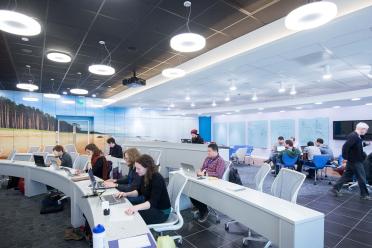
This will invest £1.2 million to support placements, secondments and other activities that contribute to the mobility and development of researchers and technical staff at leading bioscience organisations.
The funding is to support talented researchers and technical staff in industry and academia who have the potential to be the next generation of leaders within UK academic and industrial research.
The awards will support the exchange of personnel, perspectives and knowledge, skills and expertise between the academic and industrial sectors.
David McAllister, BBSRC Director of Talent, Inclusion and Funding Delivery said: “This latest investment underlines BBSRC’s commitment to nurturing the nation’s bioscience talent. Supporting the mobility of early career researchers and technical professionals across the UK will aid knowledge exchange and strengthen collaborations and will help develop them as future research and innovation leaders in academic and industrial bioscience. I am looking forward to hearing how this investment is catalysing great ideas and supporting a diversity of individuals in driving their careers forward.”
The account at Earlham Institute will provide training and experience for researchers and technical staff in academic and industrial sectors, focusing on two key areas for Earlham Institute’s strategy:
- Computational biology
- Molecular biology laboratory automation
Additionally, the account will support the production of technical videos detailing automation platforms and expertise at Institute, focusing on training in use of equipment and techniques.
The other grant holders include:
John Innes Centre (JIC)
The priority focus of the account is the upskilling and mobility of post-doctoral researcher associates (PDRA) and technicians by supporting a broad range of pre-selected placements.
The programme has integrated a day release model to support the inclusion of technicians as well as developing a programme of policy placements. The aim is to strengthen JIC’s partnerships with policy makers and to equip PDRAs and technicians for the transition to policy-based careers.
National Biofilms Innovation Centre (NBIC)
The account will run a competition within the NBIC consortium to support exchanges across academia and industry and with international partners. The applications will focus on the career development of their applicants whilst being aligned with the NBIC national strategy.
The Roslin Institute
The award will be used to support the exchange of talented technicians and postdoctoral researchers across academic and industrial sectors, organisations and countries. The aim is both to strengthen existing links at the Roslin Institute and develop new ones.
The account will also support additional training courses, where needed, for those whose career development was negatively impacted by the coronavirus pandemic.
University of Bristol
The account will be used to offer innovation fellowships to facilitate two-way people exchange of technicians and ECRs between University of Bristol and industry. The account will also support training in core competencies related to industry collaboration through a series of:
- online seminars
- workshops
- mentoring.
University of Warwick
The university will use FTMA funding to enhance the personal development, visibility and recognition of both technicians and researchers. This is in support of the Concordat to Support the Career Development of Researchers and the Technician Commitment.
This will be delivered through a combination of:
- secondments
- fellowships
- technology transfer days
- industrial visibility and mobility training.
The Babraham Institute
The placements offer cross-organisational training and career-development opportunities for researchers and technicians. Placements include industrial and institutional hosts to:
- maximise exposure of technicians and research staff to new environments
- meet key objectives in supporting researcher training, knowledge exchange and research translation.
Imperial College London
The account will support activities that foster ongoing links between academia and industry through the mobility or development of staff, including those that support specific training needs of individuals.
This will be delivered through:
- inward and outward secondments for early career researchers and technical staff
- short exchanges for technical staff to develop knowledge and skills
- training and development activities to help engage with industry partners.
University College London (UCL)
The account will help to grow a talent exchange gateway between the researcher development environments at UCL and partners in the knowledge-intensive bioscience industries. Movement of researchers will be facilitated through next generation innovation placements modelled on those developed in FTMA2.
These placements will be promoted as valuable career development and mobility opportunities responding to the disruption caused by the 2020 to 2021 pandemic.
University of Edinburgh
The account will be used to support ECRs and technical staff engaged in industry-linked projects aligned to ISCF objectives and visits to industrial partners or training providers to either:
- strengthen relationships
- acquire new skills
- transfer technology and expertise
- mature intellectual property.
It will also support inward placements of industrial researchers and non-UK ECRs to the university as well as supporting technical staff in professional registration and CPD courses.